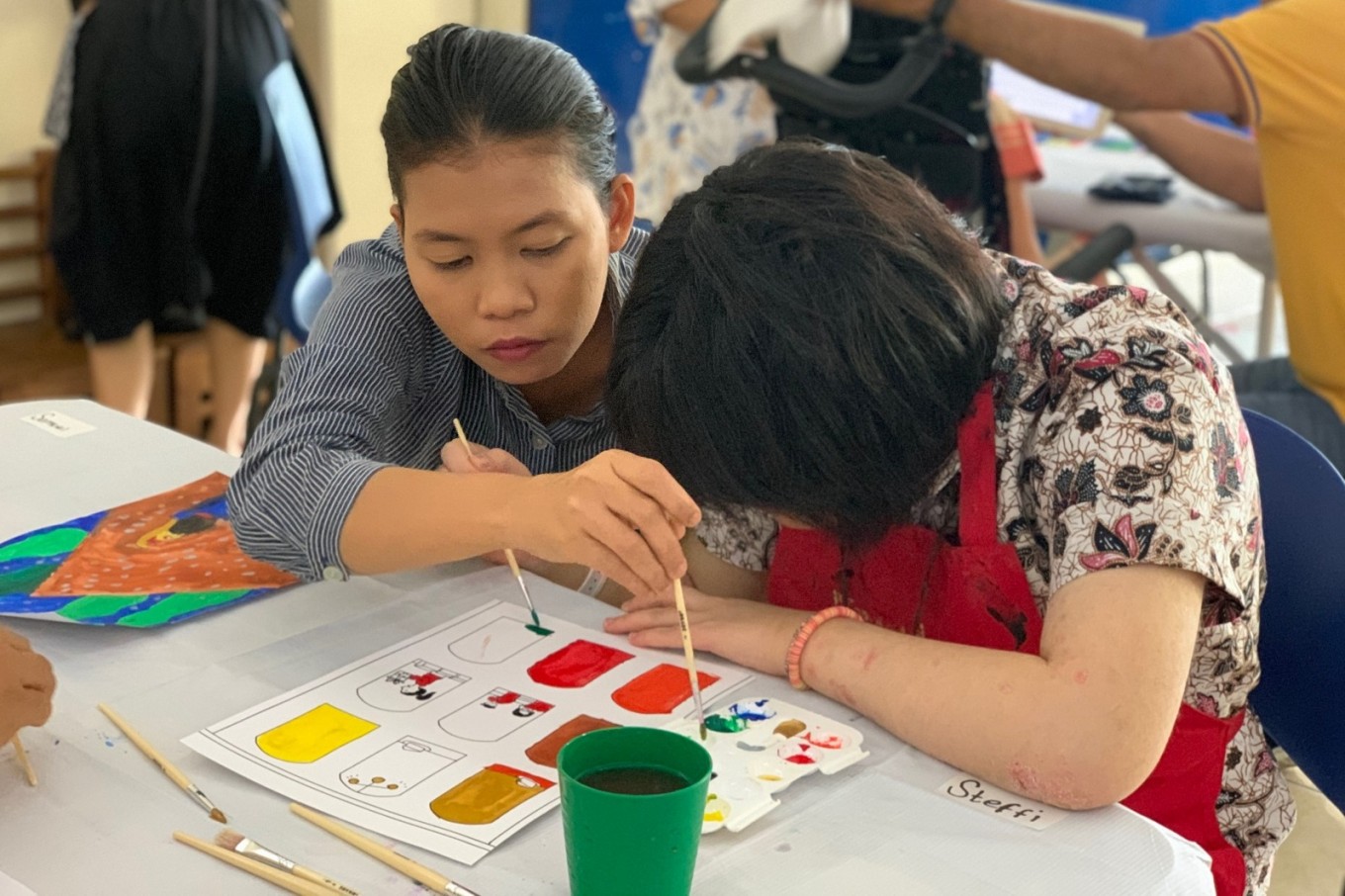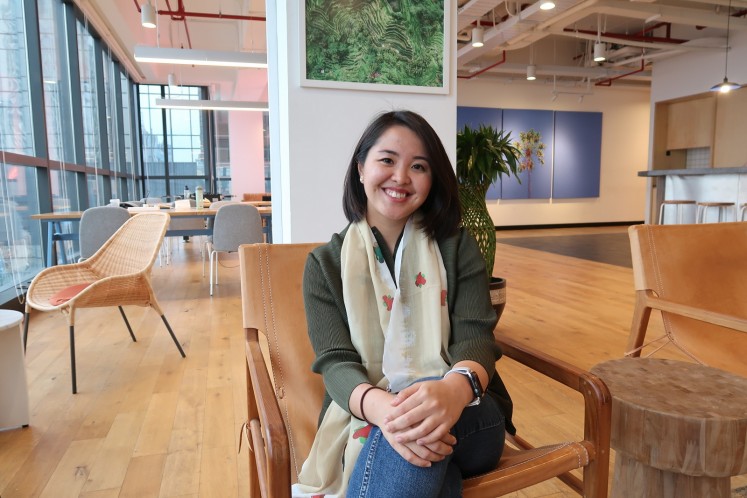Popular Reads
Top Results
Can't find what you're looking for?
View all search resultsPopular Reads
Top Results
Can't find what you're looking for?
View all search resultsTerartai helps special-needs students find a purpose in life
Most students participating in these activities are either on the severe end of the autism spectrum or have down syndrome or cerebral palsy.
Change text size
Gift Premium Articles
to Anyone
“Imagine Stephen Hawking,” Amanda Maringka said, describing the designers behind Terartai, a scarf business she recently launched.
The 27-year-old Bentley University graduate described Terartai as a social company, its scarf collections cocreated by people with special needs. “These children have a big will, but I felt like they are sort of stuck in their own body.”
Amanda told The Jakarta Post the story of how back in late 2018, she asked the question, ‘What’s next?’ after working in a market research company for five years.
“I always told myself that I have to start something but did not specifically know what to do. I just followed the path and it led me to this work. I enjoyed it, but then I was stuck in my comfort zone,” she said.
Her realization prompted her to take a three-month sabbatical, during which she spent time exploring art hobbies and volunteering for social causes.
One day, Amanda and her cousin decided to collaborate with painting event management company Bartega and hold an activity for students of Kyriakon School and Therapy Center, an educational center for children with special needs managed by parents of a friend.
“The event was basically card painting. We helped them paint on cards and canvas, and the students were so happy that the school asked us to come back several times,” she recalled, her eyes lighting up. “After a while, the students started to open up to me.”
Most students participating in these activities are either on the severe end of the autism spectrum or have down syndrome or cerebral palsy. Many are over the age of 20 and have graduated from the school, but they keep coming back because it’s hard for them to find jobs because of their limited communication abilities and the lack of proper infrastructure for them.
“They felt like they had failed and that they had no purpose in life. Sometimes, they felt like they had disappointed their parents. They want to do something for a living, but how? They couldn’t earn money. They understand that they have these conditions,” Amanda revealed, before adding, “I did not know that they can communicate that deeply, have a will that big or express themselves that far.”
Looking at the stack of paintings, untouched and piling up, Amanda thought of a way to turn them into a source of income. She decided to print the paintings into scarves and sell them.
“I set a theme and then talked to the students about it.”
Amanda Maringka poses during an interview with "The Jakarta Post" on Monday. (JP/Teresa Yovela)Read also: It’s 'deviation' and ‘mental disability': Some Indonesian institutions put ban on LGBT applicants
Pointing to Terartai’s latest Christmas collection, Terang, as an example, Amanda explained how she interviewed the students with the help of an iPad or communication boards.
“We asked the students, ‘When you think of a Christmas wish, what comes to your mind?’ And then they would answer, ‘Oh on Christmas, I think of my family, I think of the Christmas tree or I think of the New Year’s celebrations’. I tried to summarize [their answers] by compiling a top-five and then illustrated each wish into a basic sketch,” Amanda said, showing several simple sketches she made that will be colored and modified by the students to their preferences.
"I’m trying to help them express the emotions that are stuck inside them. I listen to them and express [their thoughts] for them in the form of art. And then I transform that into something wearable and sellable.”
Using the communication board, Amanda demonstrated her methods.
“I would ask, ‘Gerry, what color do you want?’ He would point to the letters ‘K’ ‘U’ ‘N’ [spelling out kuning] and I ask, ‘Yellow?’ Then he would point to ‘Yes’ or ‘No’.”
Often, she or one of the teachers would hold their hands as they color.
One time, Amanda interviewed a student regarding his Christmas wish, she was taken aback by his answer.
“He’s in a wheelchair, he can barely even move his hands. But his Christmas wish was to see his older sister able to walk again, as at that time, her feet were swollen,” she recalled the heart-warming moment.
Amanda would then bring the paintings home, scan them and edit the image to clear out certain lines and emphasize the colors for textile printing.
Terartai’s first collection, titled Sahabat, was launched in September 2019 and was received positively, its long scarves sold out within the first 24 hours.
“Never underestimate the power of ibu-ibu [mothers],” she said with a laugh.
Now, four months after the first launch through social media, word of mouth and a few bazaars, Terartai has sold over 300 scarves — more than Amanda’s expectations. The square scarves are sold for Rp 350,000 (US$25.17) per piece and the long scarves are Rp 300,000 apiece.
“Twenty percent of the revenue will go to the designers,” Amanda said. “Terartai motivates them in the sense that it gives them a purpose. They want to feel like they belong, that they contribute to their parents and the community. Now, through this platform, aside from its commission solely, to see that their work is turned into something concrete and wearable, it really brings them joy.”
As for the parents, Terartai’s activities also provide platforms for families to gather and create artworks together.
“A lot of students stay that they are lonely. Most of their parents are working really hard to provide for them, as taking care of children of special needs can be costly, whereas the children spend most of their time at school,” she explained.
“I think it’s very human for parents, even those whose children are normal, to underestimate them and say things like ‘I don’t think my child can do it’. For parents of these children, they often think, ‘If my child can survive alone, I am already more than grateful’. But Terartai made them feel proud of their children. Many of them might have felt stuck and confused about what’s next for their child. I’d like to think that Terartai gives them a glimmer of hope.”
For now, Amanda is focused on forming a team for her small business because she can barely catch up with the demand by working alone. She is also exploring options to create other sellable pieces aside from scarves.
“I thought of corporate merchandises or eco-bags for the nonplastic movement,” she explained. “Perhaps my [goal] this year is to communicate my mission more. I hope for the customers to go beyond just ‘feeling good’ but to also understand more about this community. Although, of course, we won’t deny aiming for profit, too. But the more profitable Terartai becomes, the more we need to give out, to share the blessings to the people we are fighting for, the people with special needs and the ones around us.”
Talking about the meaning of the brand’s name, Amanda recalled a phrase she believes in.
“Something that is meaningful doesn’t just fall from the sky,” she said. “I read about the terartai [lotus] somewhere and found out that they grow in the mud. They’re a symbol of struggle and darkness, but even in times of darkness, they can grow into something nice, they grow into a flower.
“I think the lotus symbolizes these kids and life in general. We’d have to struggle first, face a lot of challenges and then it becomes something meaningful.” (kes)
__________
The writer is an intern at The Jakarta Post.












